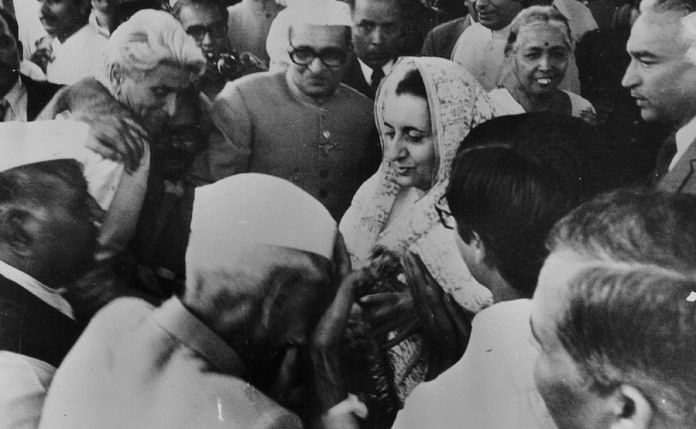In his book, Emergency Retold, Kuldip Nayar writes about how the Emergency hangover continues in government, judiciary and civil services.
How does one explain the emergency imposed in 1975, some 38 years ago, to the new generation? It does not know what emergency meant. Nor is it aware of what acts were committed during that period. What happened during the emergency? My explanation, its purport. To tackle a situation which was not there, the constitution was suspended to give sanction to such acts which were illegal.
The legitimate voice against them was the press but it was gagged. More than one lakh opposition leaders and critics were detained without trial. The cabinet gave the post-facto sanction. Power came to be constituted in the then Prime Minister Indira Gandhi and her son, Sanjay Gandhi, an extra-constitutional authority. The nation was first confused, then sank into a state of stupor, and subsequently, caved in. The administration fell in line without any resistance to follow the dictates of the ruler, and, in fact, become instruments of tyranny. Before them, there was no ethical consideration nor any spirit to save the public. They were so afraid that they competed with one another to prove readiness or loyalty to carry out illegal, capricious fiats.
Indeed, a democratic country slipped into dictatorship, without realizing it. Once the thin line between what is right and wrong, moral and immoral, was erased, people acted along the lines of crowd mentality, headed by Indira Gandhi, and more so, Sanjay Gandhi. The Congress government does not want to talk about it as long as the Indira Gandhi-Sonia Gandhi dynasty, that is the guilty, are still in power. It considers the attack on Mrs Gandhi’s autocratic rule during that period an affront to the family.
Leftist Supreme Court judge Krishna Iyer gave her reprieve through a stay order on the high court’s judgment. Once she was off the hook, she showed her hand and extinguished the lights of democracy that had distinguished India from other third world countries. With the help of her son, Sanjay Gandhi, an extraconstitutional authority, she changed laws and destroyed the institutions built carefully and methodically by her father, Jawaharlal Nehru, over the years. She became law unto herself, concentrating all authority in her office, and did whatever she and her son fancied. The courts of law gave no reprieve because judges were afraid. Civil servants did not because they were afraid to lose concessions which they received for obedience. Institutions did not function because those running them were afraid of imagined apprehension. A nation which had fought bravely against the British for 150 years to win freedom was in no time a crowd of self-seekers, pushing one another for the leafs of office.
Mahatama Gandhi, if he had been alive, would have been the saddest person because of the manner in which the fabric of values was torn apart beyond repair. The government appointed a commission to assess excesses committed and the circumstances in which the emergency was imposed was no justification. There were no threats to the well-being of the nation from sources external or internal. The conclusion, in the absence of any evidence given by Smt Indira Gandhi or anyone else, was that the one and only motivating force for tendering the extraordinary advice to the President to declare an “internal emergency” was the intense political activity generated in the ruling party and the opposition by the decision of the Allahabad High Court declaring the election of the Prime Minister of the day invalid on the ground of corrupt election practices. There is no reason to think that if the democratic conventions were followed, the whole political upsurge would, in the normal course, have not subsided. But Smt Gandhi, in her anxiety to continue in power, brought about instead a situation which directly contributed to her continuance in power and also generated forces which sacrificed the interests of many to serve the ambitions of a few.
Thousands were detained and a series of totally illegal and unwarranted actions followed, involving untold human misery and suffering. In the absence of an explanation, the inference is that a political decision was taken by an interested Prime Minister in a desperate endeavour to save herself from the legitimate compulsion of a judicial verdict against her. There was no odium in hitting below the belt, nor indulging in foul means.
No one talked about values, much less about fair methods. There were no limits to which Mrs Gandhi did not go to serve her ends. Still worse, she banished morality from politics. The nation was shaken but then fell silent. Fear stalked the land. So much so, even the judiciary dared not pronounce a judgment which the government would not like. And the media became more loyal than the censors. The institutions never got back their original vigour or sanctity. Those who ruled after the emergency concentrated more on undoing Mrs Gandhi than correcting her misdoings. Most of them, even state chief ministers, adopted her autocratic way of governance. They found it an easy and convenient way to deal with the opposition. Since then, the civil service and the battered police have begun to obey whoever comes to power, notwithstanding the service rules or age-old traditions. Both have fitted themselves in a new mould where the requirement is obedience, not integrity which the rulers lack. The lower judiciary has still not got out of the emergency hangover when magistrates signed blank warrants of arrest. Most of their judgments appear to have been written under pressure.
The new generation must understand that today’s non-governance or mis-governance is the fallout of what Mrs Gandhi did by destroying the established order, a natural corollary. Scams from the Bofors guns to 2G Spectrum are only the tip of the iceberg. Many more scandals are going to come out in the open. People expect that the government will not drag its feet, as it has done before, when they become part of the public domain. In a democratic society, the nation expects the state to assure that vital links of the government will not be subjected to strain. But the situation is the opposite.
Going back, it all started with a by-election in Orissa in 1972. Nandini Satpathy was elected to the state assembly after spending lakhs of rupees. Gandhian Jayaprakash Narayan raised the matter of corruption with the Prime Minister. Her defence was that the Congress had no money even to run the party office. When he found no response, he took the issue to the nation. One thing led to another until JP gave the call that the battle was between the people who wanted the government accountable and the government which was not willing to come clean. The same problem has returned after 38 years.
The entire debate before the country is on corruption. The government wants to do little to eliminate it. The public is determined to end corruption once and for all, particularly when one minister after another is found involved in either the 2G spectrum scandal or some other like the Krishna-Godavari basin gas scam. The Comptroller and Auditor General has indicted the Union Petroleum and Natural Gas Ministry for “allowing irregularities and bending rules” to “oblige” Reliance Industries Ltd, resulting in an “unquantifiable” loss to the exchequer. This shows how powerful politically the corporate sector has become. People want more and more transparency while the government sees to it that the avenues for public knowledge are lessened. It even excluded the Central Bureau of Investigation (CBI) from the ambit of Right to Information (RTI) Act.
 This book was published in 2013 by Konark Publishers Pvt. Ltd. The excerpt has been taken with permission from the book’s publishers.
This book was published in 2013 by Konark Publishers Pvt. Ltd. The excerpt has been taken with permission from the book’s publishers.



